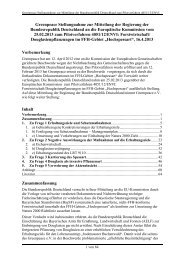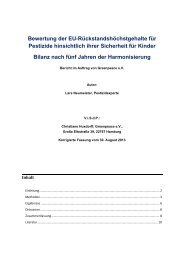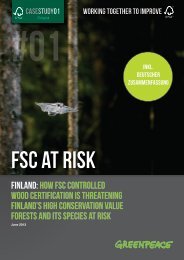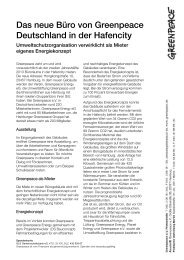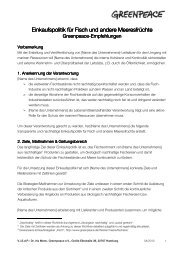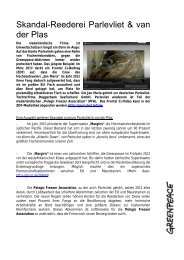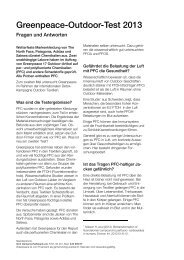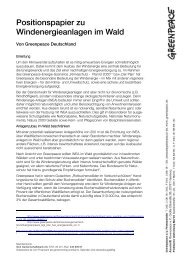Untitled - Greenpeace
Untitled - Greenpeace
Untitled - Greenpeace
Create successful ePaper yourself
Turn your PDF publications into a flip-book with our unique Google optimized e-Paper software.
50<br />
CARVING UP THE CONGO<br />
©<strong>Greenpeace</strong>/Davison<br />
TRANS-M’S DEALS ARE A ‘SWINDLE’<br />
Trans-M’s illegal logging is<br />
causing conflict in Lomako<br />
<strong>Greenpeace</strong> has obtained a copy of a handwritten<br />
a social responsibility contract that<br />
Trans-M signed with the local community<br />
leaders of Lomako on 8 February 2005. 285<br />
The communities live beside the newly<br />
established (2006) Lomako National Park,<br />
in key bonobo habitat within the CBFP<br />
Maringa-Lopori-Wamba landscape. Trans-M<br />
holds a title for the area obtained after the<br />
moratorium (see pages 50–53).<br />
The contract was negotiated in the presence<br />
of many government representatives, including<br />
the adviser to the governor and the regional<br />
administrator. The contract commits Trans-M<br />
to improve and maintain the local road, and to<br />
build health centres and three schools. In terms<br />
of more immediate compensation to the<br />
community, Trans-M promised to deliver 20<br />
50kg sacks of sugar, 200 bags of salt, and<br />
equipment including 200 machetes, 50 axes,<br />
100 hoes, 100 files and 200 spades. In July<br />
2005, just six months after the contract was<br />
signed, concerned members of the<br />
community, organised under the name of the<br />
Association of Natives of Lomako (Association<br />
des Ressortissants de Lomako – ARELO)<br />
handed over a memorandum 286 to the<br />
Governor of Equateur Province in which they<br />
expressed their anger and frustration at the<br />
‘illegal logging activities carried out by Trans-<br />
M’. 287 The memorandum was addressed to a<br />
broad audience, including the Trans-M<br />
management in Kinshasa, President Kabila and<br />
the Environment Minister.<br />
In the memorandum, ARELO claims that Trans-<br />
M’s logging contract was signed in violation of<br />
the moratorium, and also that ‘the logging title<br />
Trans-M has obtained is located in a zone<br />
where the creation of a future protected area<br />
is being widely discussed.’ It complains that ‘no<br />
proper land use planning was done … taking<br />
into account the socio-economic realities of<br />
the local communities’ and that ‘the people<br />
were not properly consulted before this<br />
logging title was handed out’. 288 It also regrets<br />
‘Villagers within 40 kilometres<br />
of the city of Kisangani are<br />
rising up against the logging<br />
companies exploiting their<br />
forests. According to village<br />
leaders, their people are not<br />
benefiting from these<br />
industrial activities. Not a<br />
single humanitarian or social<br />
action has been taken by<br />
these loggers. Villages are<br />
without schools, health<br />
centres, navigable roads and<br />
other adequate infrastructure.<br />
In short, in the majority of<br />
cases, social responsibility<br />
contracts have not been<br />
respected … At present, the<br />
most visible, the most active I<br />
can cite include Trans-M Bois,<br />
a subsidiary of Congo<br />
Futur.’ 289<br />
Radio Okapi, Kisangani<br />
(April 2006)



